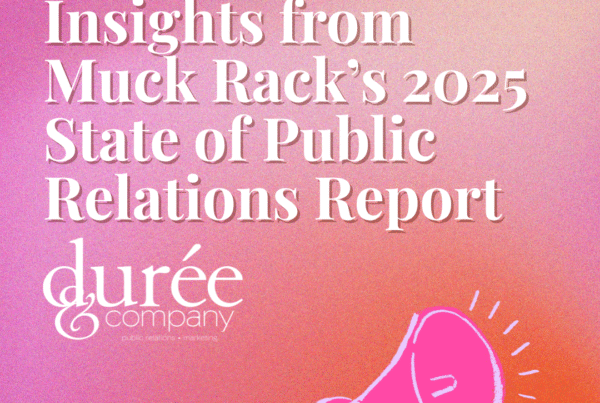
Tackling Restaurant Crisis Situations One Bite at a Time, a bylined article by Durée Ross.
Originally featured on Full Service Restaurant News (FSR Magazine)
AN INSIDE LOOK ON THE BEST WAYS TO PREPARE AHEAD OF AND PREVENT FUTURE MEDIA CRISIS SITUATIONS
In the restaurant industry, there are many unforeseeable media crisis situations, simply due to the nature of the business. Whether it’s a poor health inspection, E. coli outbreak, evidence of racism, food containing undesirable ingredients, unfortunate crimes happening inside or outside of the restaurant, there has to be an effective PR crisis plan in place to deal with these issues when it comes to the media. And, when it happens once, there must be an action plan in place if it happens again.
Today, restaurant crisis situations require immediate attention more than ever before, due to 24/7 news cycles and instant social media coverage. An unfortunate incident can go viral in a matter of seconds. Therefore, a quick and efficient response to the media is critical.
At the first sign of a crisis, it’s important to immediately engage with an experienced media relations firm. Restaurant owners cannot wait until the story develops around their business. If owners are not prepared for how to deal with the negative attention and try to tackle the issues themselves, it will backfire and make matters worse.
A restaurant owner’s first reaction to a crisis situation can easily be “no comment.” This may seem to provide time and protection from the media’s scrutiny. However, “no comment” is actually a very strong comment, and can make a negative situation even worse.
By saying “no comment,” a restaurant owner can imply guilt or prior knowledge of the situation that led to the crisis. This statement basically says that the owner is attempting to hide knowledge. There needs to be at least one answer other than “no comment” in order for audiences to have some trust in the owner, and avoid longtime damage to a restaurant or restaurant brand.
Luckily, there are many other strategies beyond stating “no comment” that won’t make the situation worse―that restaurant owners can use when responding to a crisis. By utilizing effective communications strategies, restaurant owners can respond to a crisis with a plan that allows media to accurately tell the story, as well as take critical steps to protect their reputation long after the crisis has happened.
Having a partnership with a public relations agency is an important business decision, and one that is ideal for restaurant owners. With this relationship in place, advance planning can be made to ensure potential responses are already in place.
These strategies include:
Concurrently issuing a written statement to all media. This should state only what is required to address the situation at hand.
Providing an accurate account of what happened, from the client’s point of view. Reporters want to provide correct information to their audiences. Even if it’s a statement providing information the client is and isn’t allowed to divulge―concerning legal issues, privacy rules, corporate procedures and more―it’s something that audiences can learn about the situation.
Having a conversation with just one reporter who is deeply interested in the crisis. The restaurant owner should offer what is necessary for the reporter to decide whether a story should even be written. With the help of a media relations agency, it’s entirely possible that a reporter may not find an angle to be newsworthy enough to pursue.
Being prepared to craft a response in advance (even if media doesn’t inquire). A proactive approach is always better than a reactive one. Also, restaurant owners need to keep their crisis communications team up-to-date about what’s happening. The more information the media relations firm has, the better it can do its job.
As for responding to a crisis situation via social media, transparency is paramount. It’s important to provide the facts, and communicate the who, what, when, where, why and how. From there, a media relations team can write statements geared for each platform. Restaurant owners should adhere to the following guidelines when communicating on social media regarding a crisis situation:
Communicate honestly. If owners don’t know the answer, they shouldn’t guess or provide incorrect information. They should simply admit that they don’t know the answer, and seek out the answer to provide later.
Be at the forefront of the issue, and remain accessible. There is no time more important than during a crisis to be completely visible. News and updates regarding the crisis should be posted as soon as they occur, in real time. During a time of crisis, target audiences will constantly be watching their mobile devices, awaiting the latest update.
Be prepared for confusion and doubt. It’s inevitable that there will be items that need to be clarified during a crisis. There are so many moving parts during these situations. Some work together, while others create conflict.
Constantly monitor social media platforms. In a crisis situation, the public becomes a partner in the spreading of information. Restaurant owners need to have good listening skills and provide fact-based shareable content.
In today’s world, there’s an entirely different set of rules when it comes to restaurant crisis situations. By taking the correct steps and working with the right media relations firm, restaurant owners can deal with a crisis situation effectively and calmly, and hopefully recover in a positive manner. With this knowledge, restaurants can be prepared to keep a crisis from happening again.








